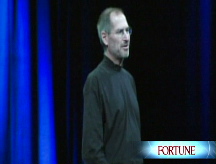The right to information vs. the right to privacy
Who should prevail: investors or CEOs?
NEW YORK (Fortune) -- "We're all very saddened by the latest news and extend to Steve Jobs our profoundest best wishes, but ..."
For years now investors and corporate-governance watchdogs have used variations on that formula before launching into tirades about Apple's tight-lipped, seemingly evasive approach to discussing the very serious health issues that have bedeviled the company's founder, resuscitator, chairman, CEO, and indispensable corporeal embodiment.
The Apple (AAPL, Fortune 500) board appears to have consistently bowed to Steve Jobs' desire to keep his health issues private. Accordingly, the board has kept investors informed about these matters - to paraphrase a line from the play A Thousand Clowns - primarily by means of rumor. Some have argued that the board's conduct has actually been illegal or, if it isn't, ought to be made so in the future. Here, in a nutshell, is what all the fuss is about.
Jobs found out that he had a rare, treatable form of pancreatic cancer in October 2003, according to Peter Elkind's article "The trouble with Steve." Apple said nothing about it until Aug. 1, 2004, the day after Jobs' surgery, when Jobs e-mailed employees to tell them that he'd just been "cured" of a life- threatening disease.
Last June, Jobs' gaunt appearance at a company event prompted press inquiries as to whether the cancer had returned. An Apple spokesperson said Jobs was suffering from a "common bug."
A month later the New York Times reported that Jobs had actually undergone a surgical procedure earlier that year "to address a problem that was contributing to a loss of weight," which apparently stemmed from the 2004 cancer surgery.
Rumors were fanned again on Dec. 16, when Apple announced that Jobs wouldn't be delivering his customary Macworld keynote address, offering a vague, non-health-related explanation. Apple's price fell 6.6% the next day.
Speculation persisted, so on Jan. 5, Jobs finally addressed the elephant in the room. though the reasons for his weight loss had long been a "mystery" to his doctors, he said, "after further testing" those doctors now believed that the problem was a "hormone imbalance" whose remedy was "simple and straightforward." Apple stock jumped 4%.
Nine days later Apple announced that Jobs would be taking an immediate leave of absence till late June. "During the past week," Jobs now offered, opaquely, "I have learned that my health-related issues are more complex than I originally thought."
Doesn't the Securities and Exchange Commission have rules about this kind of thing? Not rules specifically addressing CEO health, says Columbia law professor Jack Coffee. But two principles do apply, he says. One is that if a company does discuss a CEO's health issues, its disclosures must be "full and accurate," says Coffee. "In other words, you can't lie." (The company must also update that information as warranted.)
The other legal principle governs whether a company must address a key officer's health at all. Every quarter, Coffee explains, a public company must disclose in SEC filings "any known risk, event, trend, or uncertainty" that could affect "future results of operations." Whether a CEO's medical problems rise to that level hinges on an analysis of, well, just about everything. How indispensable is the CEO? How likely is he to be incapacitated, and for how long?
Some corporate governance watchdogs believe the SEC should adopt more explicit regulations on this, but corporate lawyers have been hostile to such suggestions out of privacy concerns.
While some CEOs have opted for transparency in these situations, others, like Jobs, have kept serious threats under wraps until after treatment. Since disclosure of a condition that is responding to treatment rarely triggers much market reaction, investors are in no position to sue even if their rights were theoretically violated.
The much thornier, mirror-image situation - where a board keeps the CEO's impending surgery secret only to see him die on the operating table - has yet to occur. When it does, some lucky plaintiffs lawyer will have himself a dynamite lawsuit. ![]()
-
 The retail giant tops the Fortune 500 for the second year in a row. Who else made the list? More
The retail giant tops the Fortune 500 for the second year in a row. Who else made the list? More -
 This group of companies is all about social networking to connect with their customers. More
This group of companies is all about social networking to connect with their customers. More -
 The fight over the cholesterol medication is keeping a generic version from hitting the market. More
The fight over the cholesterol medication is keeping a generic version from hitting the market. More -
 Bin Laden may be dead, but the terrorist group he led doesn't need his money. More
Bin Laden may be dead, but the terrorist group he led doesn't need his money. More -
 U.S. real estate might be a mess, but in other parts of the world, home prices are jumping. More
U.S. real estate might be a mess, but in other parts of the world, home prices are jumping. More -
 Libya's output is a fraction of global production, but it's crucial to the nation's economy. More
Libya's output is a fraction of global production, but it's crucial to the nation's economy. More -
 Once rates start to rise, things could get ugly fast for our neighbors to the north. More
Once rates start to rise, things could get ugly fast for our neighbors to the north. More








